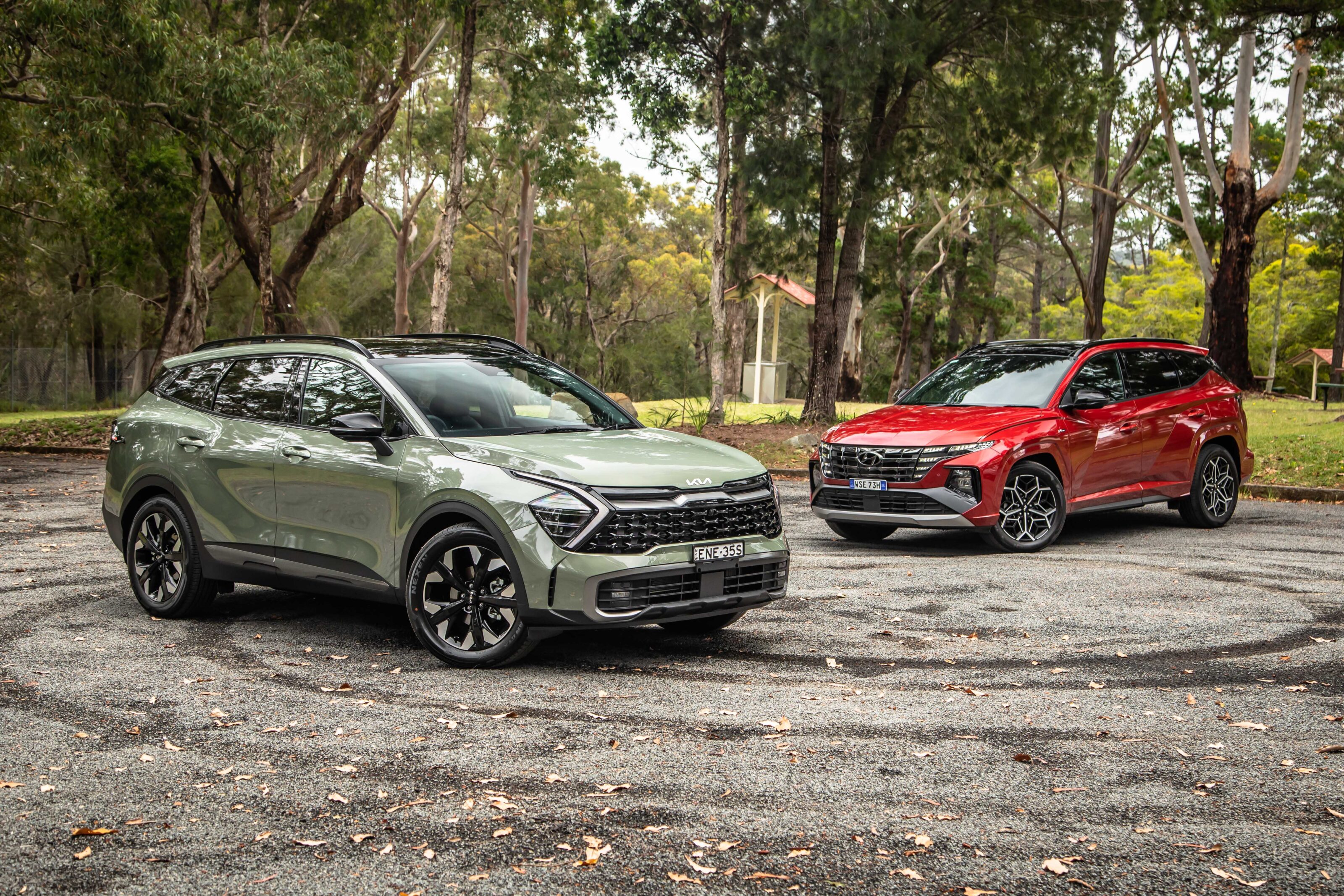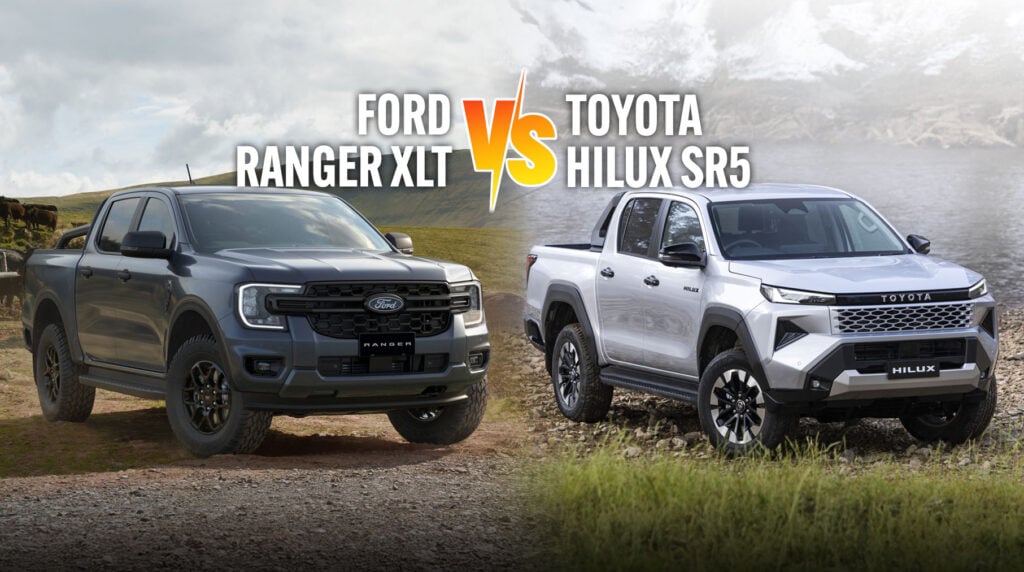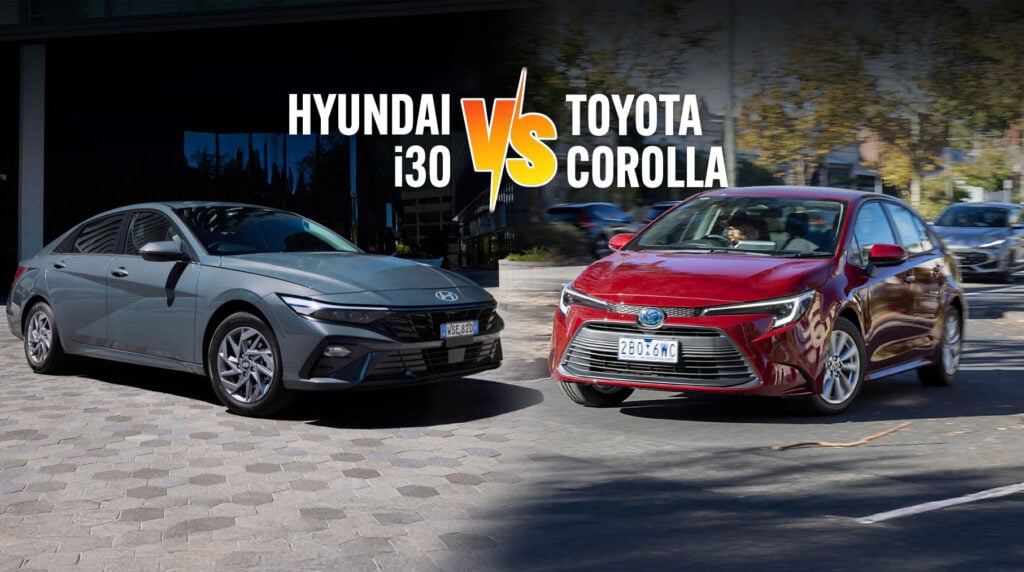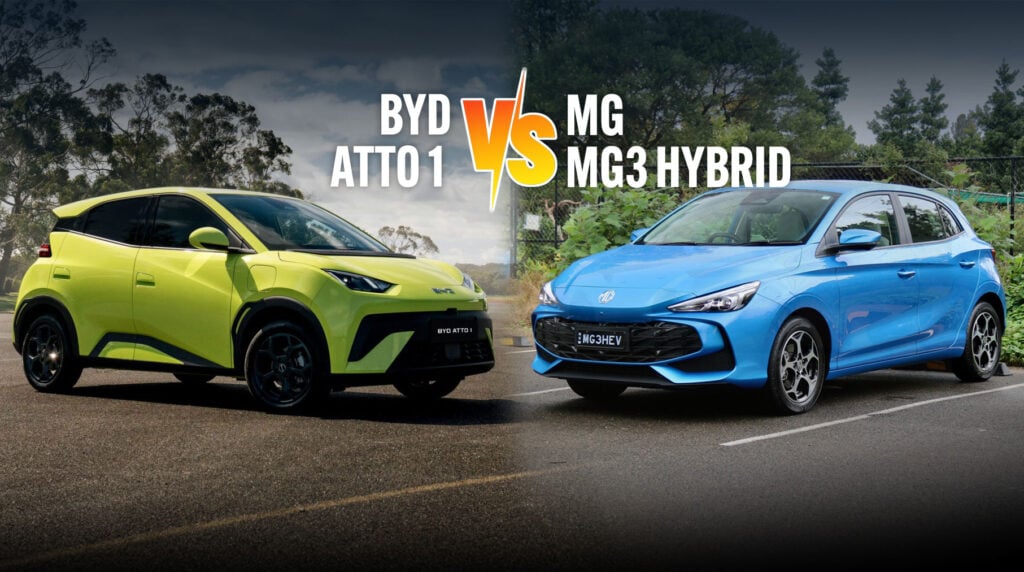Things we like
- Both look fantastic
- Kia’s after-sales package
- Cabin technology
Not so much
- Pushy lane keep system on both
- No hybrid or EV versions (yet)
- Dodgy dual-clutch transmission on both
Two Korean juggernauts in the Australian car market regularly go head-to-head in the sales charts and it never ceases to amaze me how weird this is: Hyundai and Kia are essentially the same company. Hyundai and Kia essentially fight over the same turf, with one gaining ascendancy in one segment while trading places in others.
One of the more common things I see from folks in the comments both here and at other motoring sites is, “Remember when this publication hated Hyundai/Kia?” I certainly don’t, having been a reader of Wheels since I were a lad, but do remember fair criticism of earlier product. Recently, not so much. They’re on fire, basically, dropping new product that impresses with clockwork regularity.

Both of these companies have been on our shores now for well over two decades (Hyundai has been here longer) and in 2021 released their newest challengers in the mid-size SUV market, both well overdue in this hyper-competitive space.
The two are bold, strikingly original designs hiding a common platform, common engines and similarly equipped interiors. Seems like the internal competition has delivered the kind of results customers want.
Two Korean juggernauts regularly go head-to-head and it never ceases to amaze me how weird this is: Hyundai and Kia are essentially the same company
Pricing and Features

We’re up in the top end of both ranges here. The most recent release, the Kia Sportage is only available to us in the entry-level and top-end, so we’ve gone with the flagship for now. Entry-level models are rarely the biggest sellers in the range, so we might come back to the mid-spec machines early in a future comparo.
The Sportage GT-Line starts you off at $49,370 before on-road costs and Kia generally has drive-away deals to tempt you, in this case, $51,990. Prices are most definitely up over the previous model.
Hyundai’s Tucson N-Line starts at $51,000 plus on-roads, so there is an appreciable gap in pricing.

For your more-than-half-ton, Kia supplies you a Sportage with 19-inch alloys, an eight-speaker stereo, dual-zone climate control, reversing camera, around-view cameras, keyless entry and start, adaptive cruise control, LED lighting (including headlights, daytime running lights and fog lights), digital dashboard, electric heated front seats, panoramic sunroof, power tailgate, auto wipers, wireless phone charging and a full-size alloy spare.
The Tucson’s specification is pretty much the same. The differences are, therefore, minute, like the Tucson’s seat material has more fake suede, deployed as inserts rather than behind your shoulders. It’s that close. The digital dash is slightly smaller at 10.25-inches versus Kia’s 12.3-inch, but they’re not so different that you’d notice.
Both share basically the same media system, a 12.3-inch screen with the excellent new version of the conglomerate’s infotainment
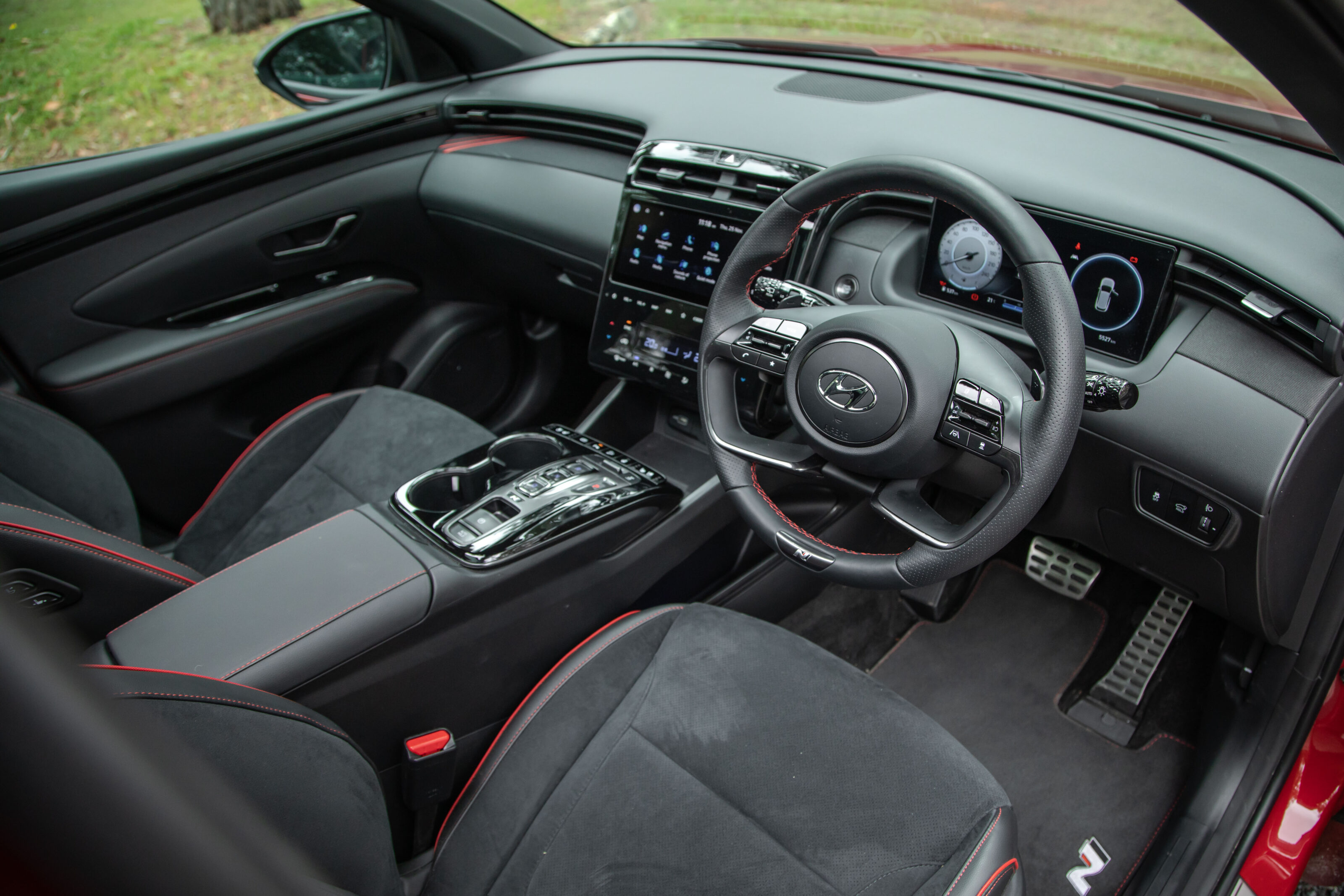
Both share basically the same media system, a 12.3-inch central screen with the excellent new version of the conglomerate’s infotainment software. It includes all sorts of features and functions including quiet mode, gentle babbling brook sounds and more detailed settings for climate control than already offered by the physical controls. The system includes DAB+ digital radio, wired Apple CarPlay and Android Auto.
Safety across the two is also extremely close. So close it’s identical. You get the usual package of airbags plus the centre airbag to help stop heads clashing in side impacts. The usual ABS, stability and traction controls, lane departure warning, lane-keep assist, speed-limit recognition, tyre pressure monitoring, blind-spot monitoring, reverse cross-traffic alert, forward and reverse auto emergency braking and forward and reverse collision warning.

The Sportage and Tucson both score safe exit warning, speed limit assist and the very clever blind-spot view monitor that replaces the left or right dial in the dashboard with an image of what’s going on down the side of the car corresponding with which indicator you’ve activated. It’s very clever and very useful.
The Kia wins here purely because it’s cheaper, by a handy couple of thousand dollars.
Comfort and Space

As you’d expect, the two are neck and neck for interior space but the designs are quite different. The Sportage’s cabin is a little more restrained and classy while the Tucson’s is very forward-looking and a bit more adventurous.
The Kia’s front seats are very comfortable and quilted in fake leather. There are some very nice materials and the shapes of the passenger side air vents vaguely echo the boomerang LEDs on the nose of the car. A thin strip of red reminds you you’re in the GT-Line. The centre console is clothed in a glossy piano black and I’m not entirely sure it’s not going to mark up horribly. The cup holders are quite clever, with a little button that pops out a semi-circular restraint to hold a cup in place. You can push them back in if you’re storing other items in there.
Frustratingly, there is a lot of grainy, scratchy plastic where it matters. The door cards, the lower dash and parts of the console all have it and it’s a bit horrid. Thankfully, it’s lifted by a quite nice strip of fake wood that starts in the doors and runs across the dash.

Hyundai’s approach to the interior is quite different. Despite the N-Line pack, the steering wheel is still the dodgy-looking (to me, anyway) four-spoke design and the centre console is a big slab of piano black covered in buttons. It doesn’t look as good as Kia’s centre stack. Between the seats, the console also hosts two cup holders but they’re a bit more cramped than the Sportage’s.
The Hyundai counters Kia’s rotary dial with a row of transmission selector buttons. It’s a slightly less coherent design than the Kia’s but perfectly easy to use. There is also less of the scratchy plastic and there’s a very fetching fabric strip in the dash that reminded us of the VF Commodore’s. The Hyundai also has a stash space between the seats under the console, which is very handy.
The Hyundai counters Kia’s rotary dial with a row of transmission selector buttons. It’s a slightly less coherent design than the Kia’s but perfectly easy to use
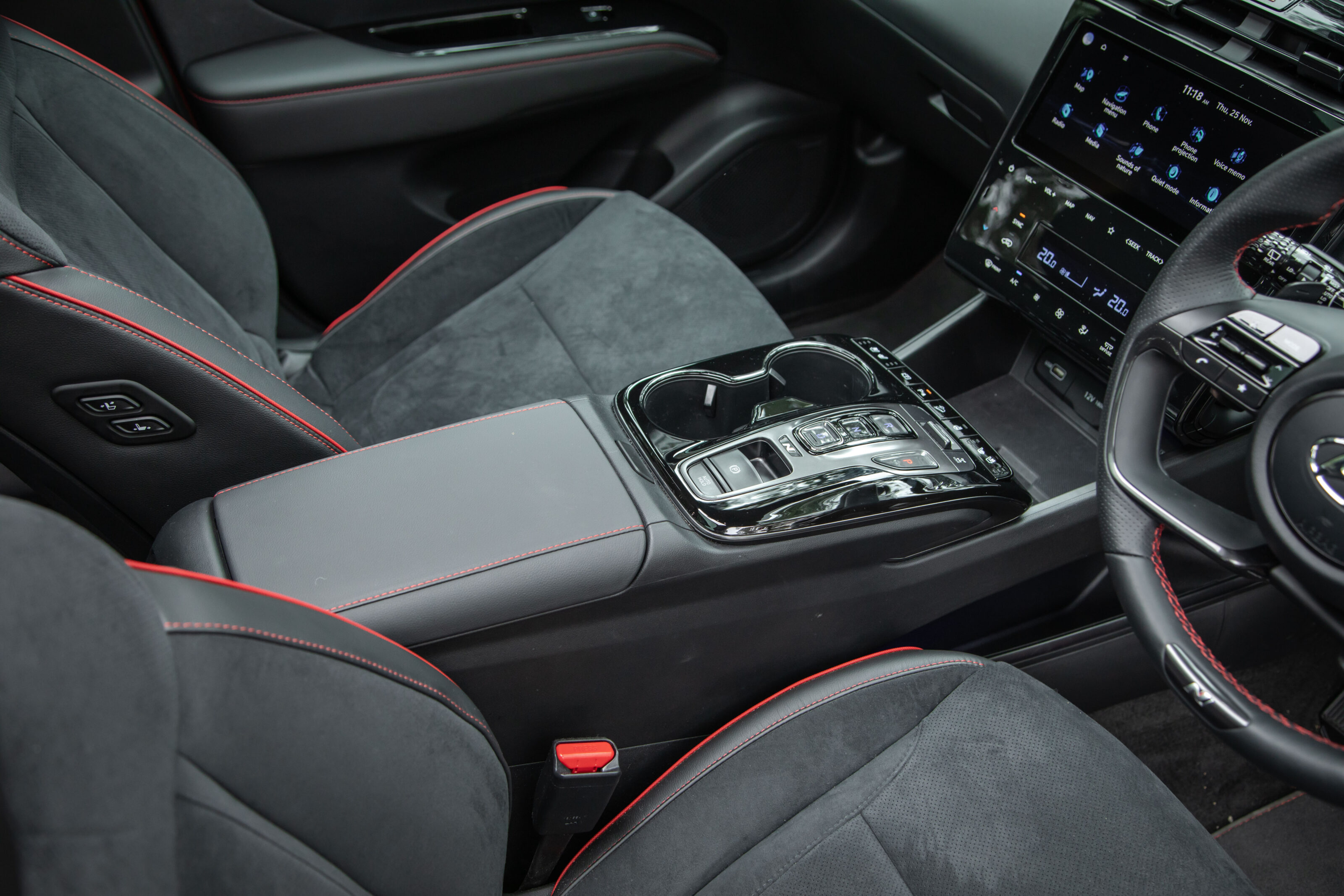
Both feature two USB ports front and rear but there’s a key difference. The Kia sports one of USB-A and USB-C up front alongside a 12-volt socket, while the rear ports are USB-C built into the sides of the front seats. What look like tablet holders in the seatbacks are actually coat or bag hooks, so that’s a slight disappointment until you realise how useful they would be. The Hyundai has two USB-A ports in the rear of the console beneath the air vents. That seems to upset people, so one imagines that one of each type would settle the aggro.
With the sunroof cover slid back, both are bright and airy cabins and my minor quibble about the Hyundai’s overall coherence doesn’t change the fact that both brands have delivered an impressive cabin experience. The Kia takes a close win here, with a better overall look and feel, easier to use controls and, purely subjectively, the lovely curve of the double screen setup feels improbably expensive.
On the Road

The engine bay is where things are fundamentally identical. Here you’ll find the same 1.6-litre turbocharged petrol four-cylinder featured through the various models in both ranges. It’s not the most inspirational or refined of engines, but nor is it anywhere near the worst. Given there are two other engines to choose from in both Tucson and Sportage, it will be well worth your while to drive them back to back before making a decision.
In both cars, you get 132kW at 5500rpm, which is a little peaky for a modern turbo engine, but there you go. Torque is a fair 265Nm available between 1500 and 4500rpm. So it’s a pretty flexible kind of engine to go with a less-than-stellar seven-speed dual-clutch automatic. Again, it’s not a bad transmission, but it’s not among the best around, such as VW’s.

Before we get into the nitty-gritty, it’s worth mentioning that the Tucson’s N-Line pack does nothing for performance; it’s purely styling unlike, say the i30 N-Line. It’s also not to be confused with the harder-edged sportiness of the i30 N and Kona N. The spec is Highlander with a $1000 wheels and bits and pieces pack and is available up and down the range.
As you might expect, the virtually identical engine and gearbox combination delivers – most of the time – the same kind of experience. As I’ve already said, that seven-speeder could be better and it’s mildly perplexing that the conglomerate’s eight-speed transmission isn’t offered in these flagship products. It fits across the engine bay of an i30 so would fit here too. Perhaps the 1.6-litre engine won’t play nice with it.
The dial swings back towards the Sportage in the chassis. While the Hyundai’s is undoubtedly a little sharper, you do have to sacrifice ultimate ride quality

In general usage, it’s mostly happy to do what’s asked of it, but the Kia’s is noticeably laggier in Normal mode and the more you ask of it, the more hesitant it becomes. It’s probably something an owner would learn to live with, but jumping between the two cars on the same day you realise the Hyundai’s calibration appears better. More responsive, a bit more eager to please. The Hyundai has the edge here.
The dial swings back towards the Sportage in the chassis. While the Hyundai’s is undoubtedly a little sharper, you do have to sacrifice ultimate ride quality. I had to chuckle a bit when I wrote that because honestly, they’re both so good. It’s just that the Kia is a little more settled in more situations. In the city it’s more comfortable – and you really only work that out when you’re back-to-back – and out on the open road, the Kia handles undulations and flowing bends really well. As does the Hyundai, it’s just that the Kia is slightly better and feels better enough to notice.

The pair of them suffer from the same overly-pushy lane-keep assist system which is mostly fine on fast, straight roads but annoying on back roads. You’ll quickly learn where to turn it all off.
It’s not just the suspension, though, the steering in the Kia feels ever-so-slightly more convincing. What makes the Kia’s slender win here impressive is that the previous Sportage, as good as it was, could never get this close to the previous Tucson.
Ownership

It gets a bit spicy here. Hyundai offers a five-year warranty with unlimited kilometres while Kia offers seven. Both have irritatingly short 12 month/10,000km service intervals but do feature capped-price pay-as-you-go servicing and pre-paid plans.
Hyundai’s lifetime capped-price servicing plan goes, well, for as long as the car will last. The first five services are capped at $319, with the sixth jumping to $385, the seventh $640 and then dipping back into the $300-$450 for a few more after that. The total over seven services is $2620 or an average of $374 per service.
If you dial it back to five services, it’s fairly simple – $319 per service. Not as cheap as a RAV4, but few companies do servicing as cheaply as Toyota, unless it’s free. Which nobody does at this level except for promotional purposes.
Kia charges more for maintaining the same engine, hitting you for $3988 over seven years or an average of $570 per year. So while Kia’s warranty is longer, servicing is costlier.
VERDICT

This was an incredibly close thing – the tiny gap in the scores has not been engineered. It’s not just because they’re mechanically virtually identical, it’s also because both companies have worked extremely hard to catch up to the broader opposition and that has meant two companies are also battling it out with each other.
There’s so little to separate them that it has come down to things like transmission calibration (where the Hyundai wins) and cabin ambience (a slender win to the Kia).
Admittedly, I wouldn’t have either of these with the turbo-petrol, because of that dual-clutch transmission. I’d either spend extra for the diesel or accept the smoother, slower 2.0-litre front-wheel-drive. Or live in hope the eight-speed twin-clutch replaces this old dry-clutch unit before taking the plunge on the turbo-petrol, but really, I’d like to see something a bit more modern like the hybrids we don’t yet get.
Either way, it’s so close as to be a technical win for the Kia, but it’s really a draw. It’s going to come down to subjective things like styling, interior feel and driving dynamics.
In other words, take your pick – both deserve your attention.
SCORING
Kia Sportage GT-Line 1.6T: 8.5/10
Safety, value and features: 8.5 Comfort and space: 8.5 Engine and gearbox: 7.5 Ride and handling: 8.5 Technology: 9.0
Hyundai Tucson Highlander N-Line 1.6T: 8/10
Safety, value and features: 8.0 Comfort and space: 8.0 Engine and gearbox: 7.5 Ride and handling: 8.0 Technology: 9.0
2022 Kia Sportage 1.6T & Hyundai Tucson 1.6T specifications
| Hyundai Tucson Highlander N-Line | Kia Sportage GT-Line | |
|---|---|---|
| Body:u00a0 | Five-door five-seat medium SUV | Five-door five-seat medium SUV |
| Drive: | AWD | AWD |
| Engine: | 1.6-litre turbocharged petrolu00a0 | 1.6-litre turbocharged petrolu00a0 |
| Transmission: | 7-speed dual-clutch auto | 7-speed dual-clutch auto |
| Power: | 132kW @ 5500rpm | 132kW @ 5500rpm |
| Torque:u00a0 | 265Nm @ 1500-4500rpm | 265Nm @ 1500-4500rpm |
| Bore stroke (mm): | 75.5 x 89.0 | 75.5 x 89.0 |
| Compression ratio:u00a0 | 10.5 : 1.0u00a0 | 10.5 : 1 |
| 0-100km/h:u00a0 | 8.0 sec (estimate) | 8.0 sec (estimate) |
| Fuel consumption:u00a0 | 8.1L/100km (combined) | 7.2L/100km (combined) |
| Weight: | 1656kg (tare) | 1643kg (tare) |
| Suspension: | MacPherson strut front/multilink rear | MacPherson strut front/multilink rear |
| L/W/H:u00a0 | 4640mm/1865mm/1665mm | 4660mm/1865mm/1680mm |
| Wheelbase: | 2755mm | 2755mm |
| Brakes:u00a0 | mm ventilated disc front / mm solid disc rear | 305mm ventilated disc front / 300mm solid disc rear |
| Tyres:u00a0 | 235/55R19 Nexen Roadius | 235/55R19 Nexen Roadius |
| Wheels:u00a0 | 19-inch alloy wheels (full-size spare) | 19-inch machined alloy wheels (full-size spare) |
| Price:u00a0 | $51,000 + ORC/DA | $49,370 + ORC |
Things we like
- Both look fantastic
- Kia’s after-sales package
- Cabin technology
Not so much
- Pushy lane keep system on both
- No hybrid or EV versions (yet)
- Dodgy dual-clutch transmission on both
We recommend
-
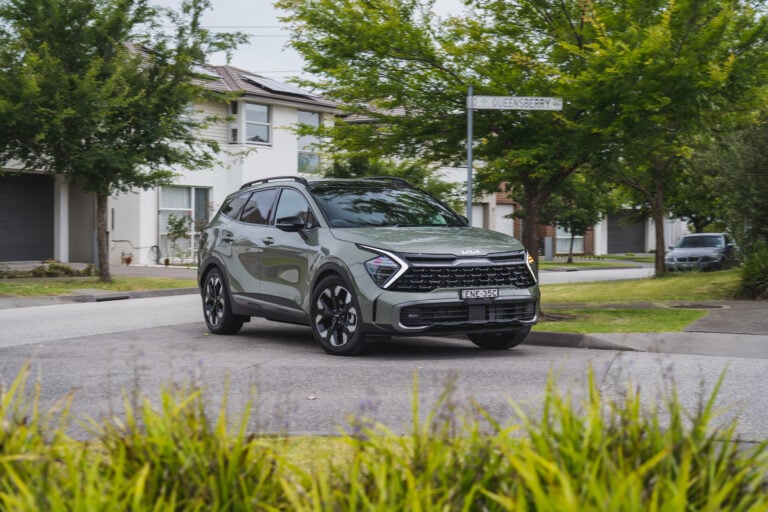 Reviews
ReviewsLiving with the 2022 Kia Sportage GT-Line 2.0 diesel AWD
More! The 2022 Sportage is more spacious, more advanced and a more premium offering than before, but is it enough to beat the best in the segment?
-
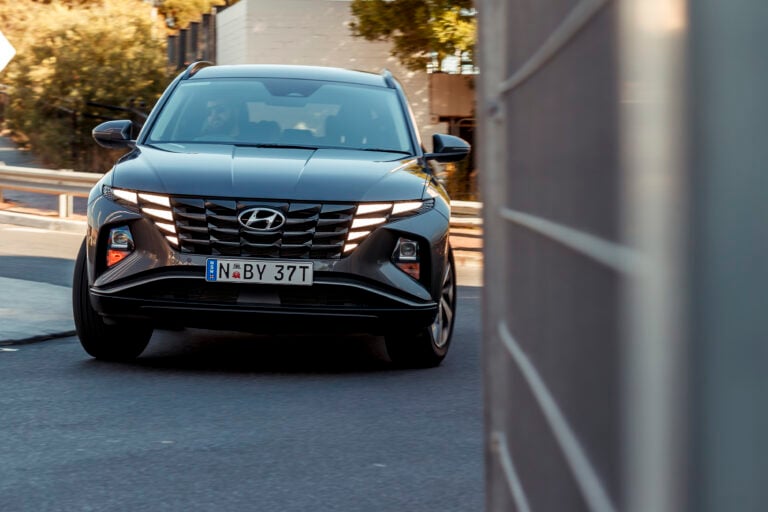 Reviews
ReviewsLiving with the 2022 Hyundai Tucson 2.0 petrol & 2.0 diesel
The Tucson is one of Australia's most popular family cars, but does this mid-spec, non-turbo petrol variant deserve to be on your shopping list? To find out, we're spending a few months with it


